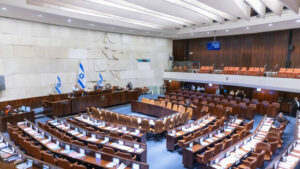(JNS) The 120 lawmakers who make up Israel’s 25th Knesset were sworn in on Tuesday, exactly two weeks after Prime Minister-designate Benjamin Netanyahu’s victory in the national election.

During the parliamentary ceremony, legislators, one after the other, stated, “I commit” in response to their names being called out in alphabetical order.
“The citizens of Israel today are proud of their country, which this year will celebrate 75 years of independence, and they believe in the righteousness of its cause; but at the same time, to tell you the truth, they are exhausted from the infighting and its fallout,” President Isaac Herzog said in remarks to the Knesset plenum.
“Now, the responsibility lies first and foremost with you, the public’s elected representatives. Responsibility to try to wean us off this addiction to never-ending conflicts,” he added. “[The public] expects us, all of us, to wake up every morning and look out for them.”
Netanyahu’s right-religious bloc—consisting of his Likud Party, Religious Zionism, Shas and United Torah Judaism—secured 64 seats in the Nov. 1 vote, and he remains engaged in coalition negations after having been handed the mandate on Sunday to form the Jewish state’s 37th government.
While Netanyahu had aimed for his Cabinet to be inaugurated alongside the Knesset, talks with his prospective coalition partners remain ongoing.
According to Israeli media, Netanyahu has not spoken to Religious Zionism head Bezalel Smotrich in nearly a week, over disagreements regarding which ministry the latter will oversee.
Netanyahu is reportedly reluctant to assign Smotrich the Defense Ministry and has instead offered him the Finance Ministry, a post which is desired by Shas leader Aryeh Deri.
Meanwhile, Netanyahu has floated the idea of appointing former Israeli ambassador to the United States and longtime confidante Ron Dermer as foreign minister, despite him not having run in the elections. While the prime minister must be a member of Knesset, that requirement does not hold for other Cabinet members.
Netanyahu is expected to bridge the divides. According to Israel’s Basic Law: The Government, the prime minister-designate has until Dec. 11 to do so, with the possibility of a 14-day extension from the president.
*
Preceding provided by JNS.org